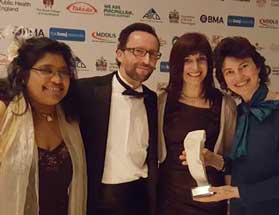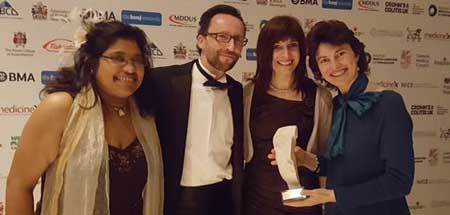
Professor Rebecca Fitzgerald and her team scooped the Gastroenterology Team award at the BMJ Awards 2016 on 5 May for devising an innovative test for oesophageal cancer.
One of the biggest challenges facing cancer patients and clinicians is late diagnosis of the disease.
Professor Fitzgerald’s team set about finding an effective way to diagnose and monitor people with Barrett’s oesophagus, which is a condition that can develop into oesophageal cancer. They wanted to find a way to check these patients regularly without the need for repeated, unpleasant endoscopies.
Their idea is deceptively simple – a rough textured sponge on a string encased in a soluble capsule. When the capsule is swallowed it dissolves in the stomach. The sponge is then pulled back up to the mouth, picking up cell samples from the length of the gullet on the way, which can then be analysed in the lab for signs of cancer.
Once they'd established this ingenious method of collecting the cells, the team then needed to develop a reliable test to distinguish cells at risk of becoming cancerous from normal cells. Their research identified a protein, called TFF3 (Trefoil Factor 3), which is found in the pre-cancerous cells. They have managed to create a lab test which can flag up cells containing this marker protein. Patients that test positive for this marker protein are likely have Barrett’s Oesophagus and therefore at an increased risk of developing oesophageal cancer. Once diagnosed, patients can then undergo surveillance and be treated earlier to avoid disease progression.
The device and lab test, called the Cytosponge, has taken 10 years to progress from the initial concept to clinical application, and it is now entering the final testing stage.
Speaking about the new test, Professor Fitzgerald said: “Our new Cytosponge test for cancer of the oesophagus has been a really exciting collaboration with lots of scientific disciplines. It has involved working with engineering and manufacturing for the device, developing new lab tests to see whether the cells are pre-cancerous and working with primary care and public health to place the test into the clinic. It is a very simple idea but it seems to work!
“We are now launching a new Cancer Research UK funded trial. This will be a trial of over 9,000 patients recruited from 176 surgeries spread throughout the UK. The surgeries will be randomised into two groups. One group will treat their patients with heartburn in the same way that they would usually. The other group will offer all their patients a Cytosponge test to see whether they have Barrett's (a condition that can in some cases develop into cancer) as part of their clinical care. The trial will take three years to complete and should tell us whether this test is suitable for routine clinical use.
“Then we’ll take it to the National Institute for Health and Care Excellence and say, ‘Here it is.’”
The trial is called BEST3 and will start recruitment in late summer. Members of the trial team will be available to talk about the trial for International Clinical Trials Day on Friday 20 May. There will be a stall promoting clinical trials, including the opportunity to take part in a mock 'chocolate trial' on the main concourse at Addenbrooke’s Hospital from 11.30-14.00.
Professor Fitzgerald collected the award with her colleagues, pictured above left to right: Mrs Irene Debiram-Beecham, Research Nurse, has coordinated all the Cytosponge studies; Dr Pierre Lao-Sirieix, Senior Scientist, was instrumental in the discovery and implementation of biomarkers; Dr Maria O'Donovan, Consultant Pathologist and Research Associate, has been pivotal to Cytosponge processing methods and scoring; Professor Rebecca Fitzgerald, who also co-leads the Early Detection Programme for the Cambridge Cancer Centre.
















